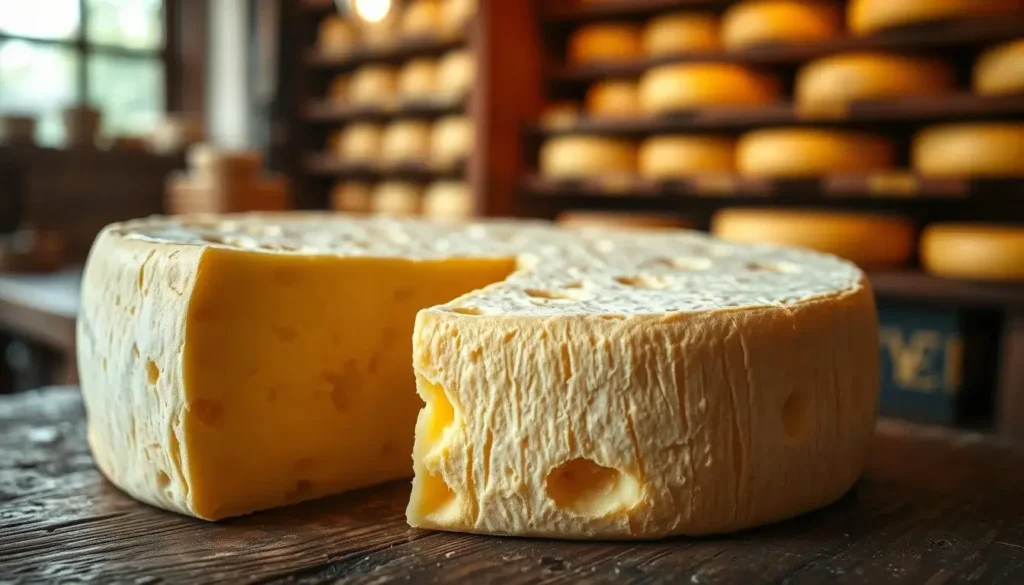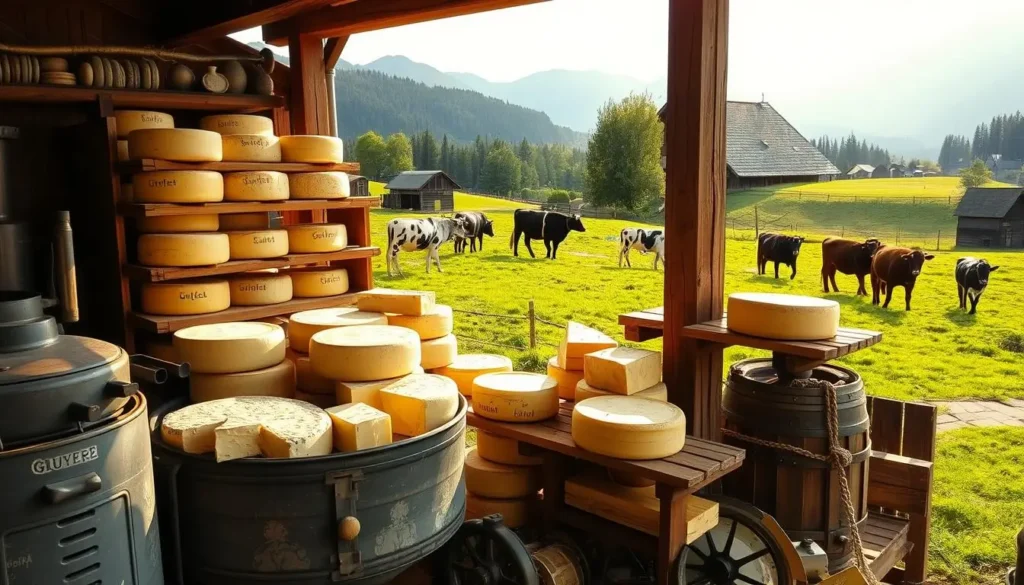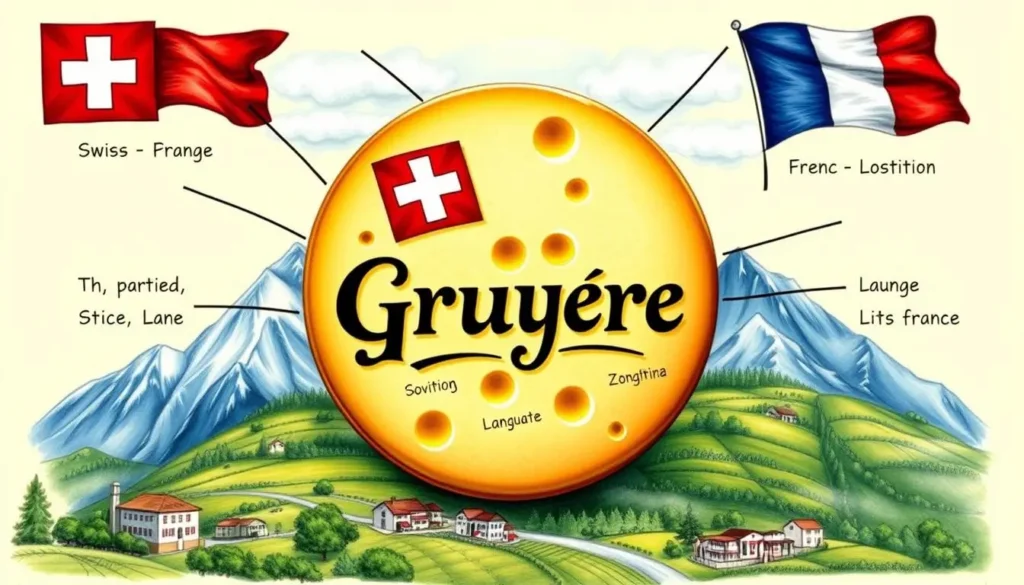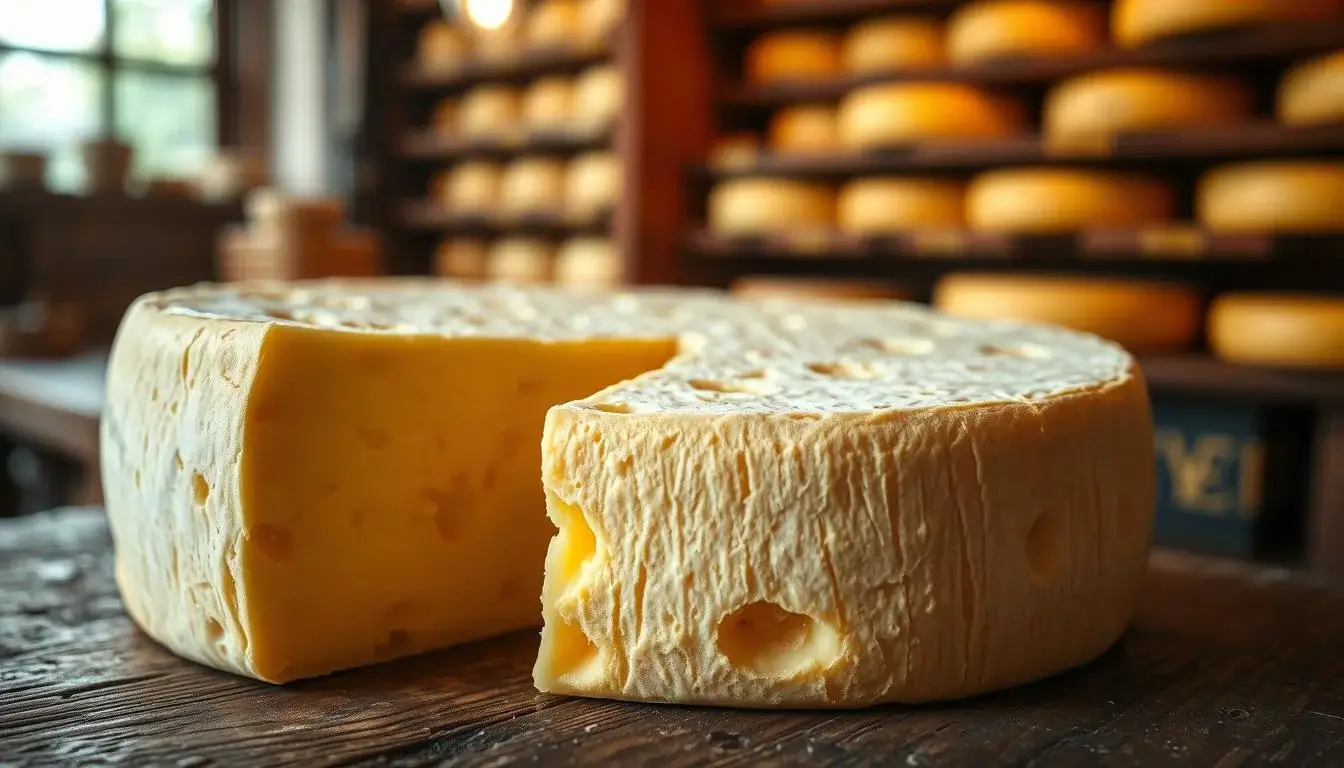Learning how to say “Gruyere cheese” in English can be tricky. But, it’s key for anyone who loves food. Knowing how to say Gruyere right is more than just speaking well. It’s about understanding the rich history and culture behind this famous cheese.

Getting Gruyere cheese’s pronunciation right is important for talking about food. It changes how we see and enjoy this tasty cheese. With the correct pronunciation, we can truly appreciate its flavor and history. This lets us explore the world of cheese names with confidence.
Key Takeaways
- Mastering Gruyere pronunciation is essential for food enthusiasts
- Correct pronunciation shows appreciation for the cheese’s cultural heritage
- Gruyere cheese has a rich history and flavor profile
- Correct pronunciation is crucial for effective communication about food
- Exploring cheese names like Gruyere can enhance our culinary experience
Table of Contents
Understanding Gruyere Cheese and Its Significance
Gruyere cheese comes from Switzerland and has a long history. It was first made in the 12th century in Gruyères, Switzerland. Today, it’s loved not just in Switzerland but also in France, where it’s known as French cheese.
Knowing how to say Gruyere is important. Respecting the tradition of this cheese shows respect for Swiss and French culture. Its flavor, which is nutty and slightly sweet, makes it a favorite in many dishes, like fondue and croquettes.
Origins of Gruyere Cheese
Gruyere cheese started in the Swiss canton of Fribourg. Monks made it from cow’s milk in the 12th century. It was aged for months to get its unique taste and texture.
Why Pronunciation Matters
Getting Gruyere’s pronunciation right is more than just correct speech. It shows respect for the cheese’s culture and tradition. Using the right words can change how people see and enjoy the cheese.
Cultural Impact in Modern Cuisine
Gruyere cheese has greatly influenced modern cooking. Its special flavor and texture make it a key ingredient in many dishes. It’s found in Swiss and French food, as well as in international recipes.

In summary, knowing about Gruyere cheese and its importance is key to understanding its role in today’s food world. By honoring its tradition and heritage, we can truly appreciate its unique taste and its role in Swiss and French cuisine.
| Cheese Type | Origin | Cultural Significance |
|---|---|---|
| Gruyere | Switzerland | Rich history and cultural heritage |
| French cheese | France | Popular ingredient in French cuisine |
The Swiss vs. French Pronunciation Debate
There’s a big difference in how Swiss and French people say Gruyere. This comes from their languages and cultures. It’s interesting to learn about in a language guide.
The debate centers on syllable emphasis. Swiss people stress the first syllable, while the French stress the second. This small change affects the sound a lot. A good language guide should teach both ways to help learners get it right.
Some important points in the Swiss vs. French debate are:
- Historical and linguistic roots of each pronunciation
- Cultural significance and regional variations
- Phonetic differences and emphasis on syllables
By looking into these points, learners can better understand the right way to say Gruyere. Correct pronunciation shows respect and cultural awareness.

The Swiss vs. French debate shows how complex and rich language is. It stresses the need for a detailed language guide to learn correct pronunciation.
| Country | Pronunciation | Emphasis |
|---|---|---|
| Switzerland | Gru-yere | First syllable |
| France | Gru-yere | Second syllable |
How Do You Say Gruyere Cheese: Breaking Down the Pronunciation
To master the pronunciation of Gruyere cheese, it’s key to understand the food terminology behind it. Pronouncing Gruyere can be tough for those who don’t speak it as their first language. But, with a simple guide, you can learn to say it like a pro.
First, let’s break down the word “Gruyere” phonetically. The right way to say it is “groo-YEHR,” with a bit more stress on the second syllable. Here’s a step-by-step guide to help you practice:
- Gru-: a soft “g” sound, almost like a gentle “gr” sound
- -yere: a long “e” sound, similar to the “e” in “cheese”
For a clearer explanation, listen to audio examples of native speakers saying Gruyere. This will help you understand the word’s correct intonation and rhythm.
Using the correct Gruyere pronunciation is important when talking about food terminology. This is especially true in culinary or restaurant settings. By practicing the phonetic breakdown and syllable-by-syllable guide, you’ll be able to confidently order Gruyere cheese or talk about its rich flavor with others.
Remember, mastering the pronunciation of Gruyere cheese takes time and practice. With patience and dedication, you’ll be able to say it like a native speaker. You’ll also impress your friends with your knowledge of food terminology.
| Pronunciation Guide | Audio Examples |
|---|---|
| Gru-: soft “g” sound | Listen to native speakers |
| -yere: long “e” sound | Practice with audio examples |
Common Pronunciation Mistakes to Avoid
Many people struggle with saying cheese names right. Gruyere is a big one, even for cheese lovers. Knowing the common errors and how to fix them is key.
Improving your cheese name pronunciation takes practice. Here are some tips to help you:
- Listen to native speakers and try to mimic their pronunciation
- Practice pronouncing the name of the cheese several times a day
- Focus on the syllable stress and intonation
Other cheeses like Brie, Feta, and Mozzarella are also tricky. Knowing these common mistakes can boost your confidence when talking about cheese.
Here’s a table to help you with the correct pronunciation of some popular cheese names:
| Cheese Name | Pronunciation |
|---|---|
| Gruyere | groo-yair |
| Brie | bree |
| Feta | fee-tah |
Regional Variations in Pronunciation
The way we say Gruyere, a Swiss cheese, changes a lot from place to place. This shows how different cultures and languages shape our speech. It’s key to know how each area pronounces words uniquely.
In the U.S., people often say Gruyere with a strong first syllable. But in the UK, it sounds more like the French original. Everywhere, people have their own way of saying Gruyere.
- American English: /ɡruːˈjɛr/
- British English: /ɡrʊˈjɛər/
- French: /ɡʁɥiˈjɛʁ/
These differences show how complex language is. They remind us to value the cultural background of words. By embracing these Regional variations, we can better appreciate language and culture. And we can enjoy the taste of Swiss cheese like Gruyere even more.
Language is a mirror of culture, and how we say words is a big part of it. By understanding and valuing Regional variations in pronunciation, we can improve communication and respect between cultures.
Tips from Cheese Experts and Linguists
Learning to say Gruyere correctly can be tricky. Expert tips can really help. Cheese experts and linguists say the secret is knowing where the word comes from. Since Gruyere is a French cheese, its pronunciation is unique and often gets mixed up.
Here’s what experts suggest to get better at saying Gruyere:
- Listen to how native speakers say it and try to copy their sound
- Break the word into parts to practice each syllable
- Pay special attention to the “r” sound, which is different in French
By using these expert tips, you can get better at saying Gruyere. This will help you talk about French cheese with more confidence. Whether you love cheese or just want to get better at speaking, learning to say Gruyere right is a good start.
With practice and patience, you can get really good at saying Gruyere and other French cheese names. So, go ahead and try it out. And don’t hesitate to ask for more expert tips!
| Cheese Type | Pronunciation |
|---|---|
| Gruyere | Groo-yehr |
| Camembert | Kah-mohn-bair |
| Brie | Bree |
Using Gruyere in Conversation: Practical Examples
Learning to say Gruyere right can make your cooking and social life better. With some practice, you can order dishes with Gruyere confidently. You can also talk about cooking with friends or suggest wine pairings. These practical examples will make you more comfortable in different situations.
A language guide is very useful for learning Gruyere’s correct pronunciation. A few simple tips can help you sound more confident when you say the word. For example, when you order, saying “I’ll have the Gruyere fondue, please” shows you know the dish and can say the cheese’s name right.
Restaurant Ordering
- Ordering Gruyere-based dishes, such as fondue or croquettes
- Asking for Gruyere as a substitute for other cheeses
- Requesting a wine pairing recommendation to complement the Gruyere
Cooking Discussions
Talking about cooking with friends? You can bring up Gruyere in dishes like mac and cheese or quiches. This shows you know about different cheeses and can say their names right.
Wine Pairing Conversations
Gruyere goes well with wines like Chardonnay and Pinot Noir. Knowing how to say Gruyere lets you talk about wine pairings. You can suggest different wines to your friends.
The Impact of Correct Pronunciation in Professional Settings
In professional settings, like the culinary world, international business, and education, getting terms right matters a lot. Saying things like Gruyere correctly shows you’re serious and skilled. It helps you communicate well and earn respect.
For example, when you order Gruyere cheese or talk about it with wine, saying it right makes a big difference. It shows you’re knowledgeable and professional.
Some key benefits of correct pronunciation in professional settings include:
- Enhanced credibility and authority in one’s field
- Improved communication and understanding with colleagues and clients
- Increased confidence in professional interactions
Getting Gruyere right can show you’re a true culinary expert. In professional settings, paying attention to language and how you say things is key. It helps build trust and respect.
Mastering the correct pronunciation of terms like Gruyere shows you’re dedicated to excellence. It’s important in your career, whether in cooking or other fields. In professional settings, being accurate with language is crucial.
Conclusion: Mastering the Art of Saying Gruyere
Learning how to say Gruyere cheese correctly opens a door to its rich history and global importance. It shows our respect for food traditions and connects us to a worldwide community of food lovers. This connection is made through mastering the right pronunciation of “Gruyere.”
When you order Gruyere or talk about it with friends, saying it right makes a difference. It adds depth to our conversations about food and wine. This small detail makes our shared love for fine cuisine even more special.
So, the next time you hear or say Gruyere, remember its history and significance. Learning to say it correctly not only impresses others but also enriches our appreciation for diverse flavors and traditions. It makes our world more interesting and connected.
FAQ
What is the origin of Gruyere cheese?
Gruyere cheese comes from Gruyères in Switzerland. It has been made there for centuries. This cheese is named after the town and is a key Swiss cheese.
Why is the pronunciation of “Gruyere” important?
Saying “Gruyere” right shows respect for its cultural roots. It shows you value the Swiss and French traditions that shaped Gruyere cheese.
How do the Swiss and French pronunciations of Gruyere differ?
The Swiss say “Gruyere” with a “y” sound. The French focus on the “u” sound. These differences show the Swiss and French views on the cheese.
What is the correct way to pronounce “Gruyere” cheese?
Say “Gruyere” as “groo-yair.” Break it into two parts: “groo” and “yair.” The “y” sound is key to getting it right.
What are some common mistakes people make when pronouncing Gruyere?
People often say it as “grew-yair,” “groo-yehr,” or “groo-ee-air.” These mistakes come from not knowing the exact sounds and the “y” sound’s emphasis.
How do the pronunciations of Gruyere vary across different regions and languages?
Gruyere’s pronunciation changes with regions and languages. In America, it might sound different than in Britain. International versions also vary, showing the cheese’s global appeal.
What tips do cheese experts and linguists offer for pronouncing Gruyere correctly?
Experts suggest using a two-syllable approach, focusing on “groo” and “yair.” Listen to native speakers for better practice. Knowing Gruyere’s history helps you appreciate the correct pronunciation.
How can the correct pronunciation of Gruyere be useful in everyday conversations?
Knowing how to say Gruyere right is useful in many situations. It shows you’re knowledgeable in cooking and wine. It makes you seem more engaged in food and culture talks.
Why is the correct pronunciation of Gruyere important in professional settings?
In work, like cooking or business, saying Gruyere right shows your expertise. It shows you value cultural and linguistic details. This is especially important in fields that value tradition and precision.
Visit our Instagram page

